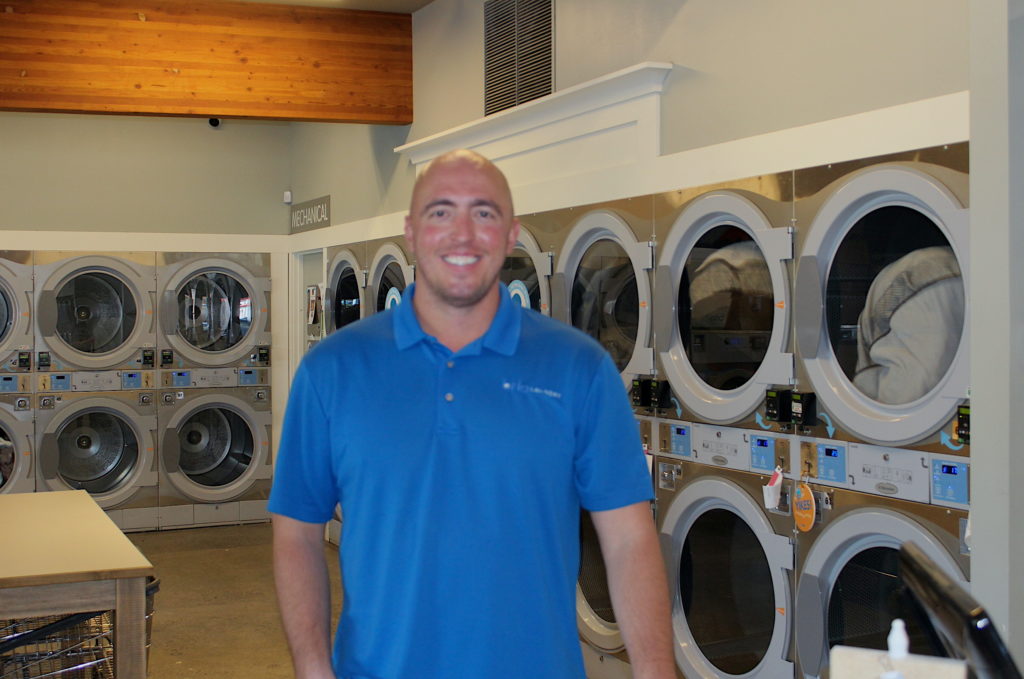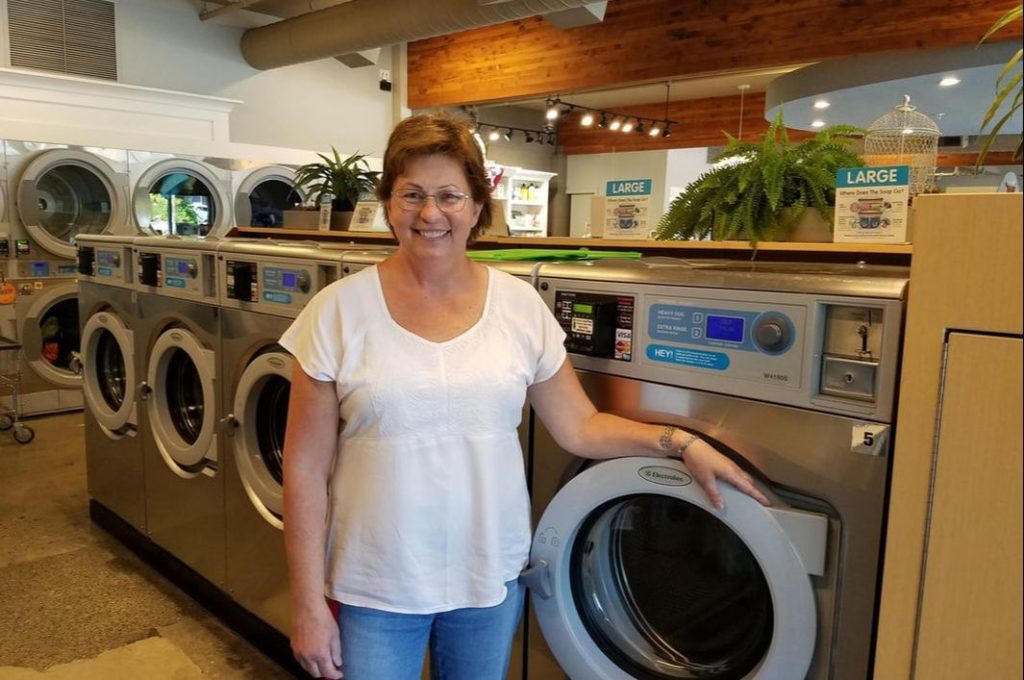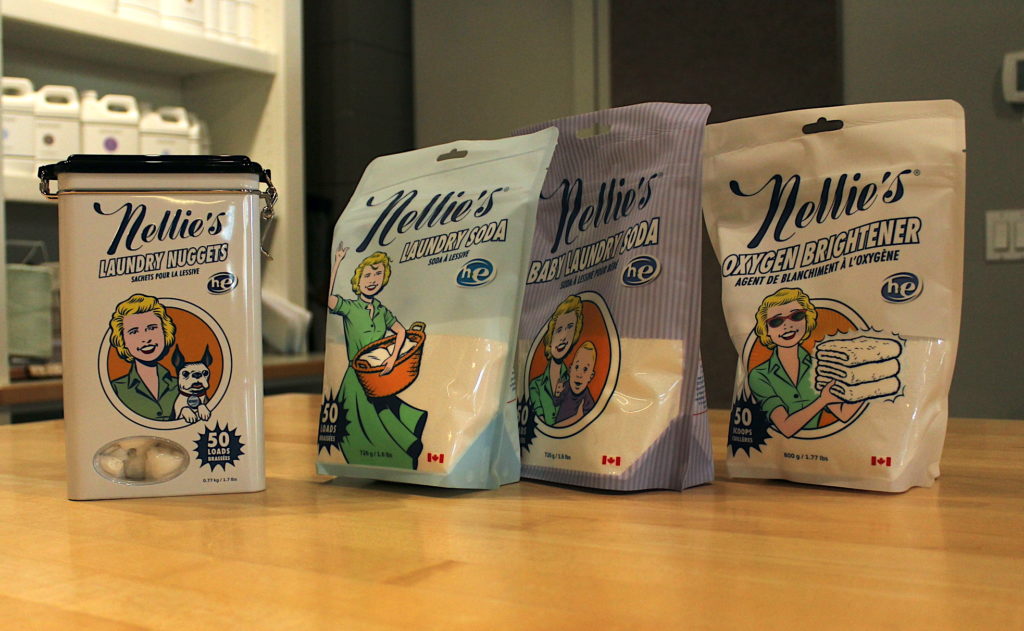Peak Sustainability Group’s Kat Klass interviewed Colleen and Travis Unema, who have been sustainability champions since the opening of planet-positive Brio Laundry and Brio Cleaners in Bellingham, WA in 2013. Learn more about how Brio’s family-owned business is redefining the laundromat experience for their customers and becoming a sustainability model for an entire marketplace nationally.
Buckminster Fuller once said, “In order to change an existing paradigm you do not struggle to try and change the problematic model. You create a new model and make the old one obsolete. That, in essence, is the higher service to which we are all being called.”
Colleen Unema combined her educator mindset with a vision to “bring sustainable environmental practices to a very old industry” known for delivering a “dirty, dingy, not-very-pleasant laundry experience.” Brio is a business based on the “planet positive laundromat” with eco-friendly washing machines and dryers, reduced energy use, strong customer focus, attention to market trends, and understanding community needs. Colleen and Travis’ entrepreneurial journey proves that sustainable approaches can succeed and thrive.

 Colleen Unema (right) is the founder and former owner of Brio Laundry and Cleaners, while Travis Unema (left), her son, recently assumed ownership of the businesses in January 2022.
Colleen Unema (right) is the founder and former owner of Brio Laundry and Cleaners, while Travis Unema (left), her son, recently assumed ownership of the businesses in January 2022.
What’s happening at Brio Laundry and Brio Cleaners?
Colleen: The BIG news is that Brio is going to be licensed all over the country!
We’ve been designing a learning management system with videos for onboarding our employees, which caught the attention of a national start-up. We’re teaching this start-up about triple-bottom-line business practices: doing laundry in a non-toxic way, while saving water, gas, and electricity.
The parent company of this start-up wants to build three Brio Laundry stores to start. Our Bellingham location will be the flagship store and national training center. We’re starting with two groups of people coming in this month. I’ll be doing the training, and Travis will be in charge of expansion and operations.
What are some of the trends you anticipate seeing?
Travis: I’m interested in shipping, supplies, and prices. With supply-chain-wide changes, we want to anticipate trends, plan ahead, and keep doing our best without cutting corners.
We also started Brio To-Go, and we’re seeing how that is evolving as people become more used to app-based transactions.
I have the Cleaners and Laundry right here in Bellingham. What if I want to expand to Ferndale, Everson, and Blaine. If we have the machines here, why would I build full facilities there? We could put laundry lockers in certain locations, pick it up, bring it to Bellingham, do the laundry at night, and drop it off. Why have two machines in different places when you could just do it with one?
Colleen: Maybe there’s a business with 20 employees and six laundry lockers at the office. Rather than having six people individually drive to and from the cleaners, now you have one Brio minivan doing all the rounds. You’ve reduced overall travel time and mileage by a factor of six. That approach has the power to scale rapidly.
Travis: To summarize, we are identifying and capturing “lost time.”
Can you talk about some of the challenges you’ve faced in the laundromat and dry cleaning industries?
Colleen: At the Cleaners, which is still a relatively new business for us, we have unique things come in like a letterman’s jacket or a vintage dress, and we say, “We’ve never had this. How do we treat it, press it, and hang it?” Of course, we always want our customers to be happy. But when you’re in fine garment care, you will have occasional failures. Those are hard ones for the team to take. We’re used to the Laundry where we have success after success, but we’re learning.
Travis: Another challenge has been employee turnover, which is a challenge that many businesses have been facing over the last few years. It’s pushed us to streamline our training and help new employees learn everything quickly.
Colleen: We look at people, planet, and profit. For people, our employees are number one. The customer is super important too, so we organize our stores to maximize customer interaction and satisfaction.
“I look at each employee’s sales. To me, those sales represent people who came to the counter and got help from our employees. We can answer questions, such as, “How do I wash this?” We emphasize customer contact, which gets lost when people only look at profit. Our commitment is to fulfill the customer’s needs and educate them on the environmental impact of what they’re doing.”
Colleen Unema, Owner, Brio Laundry and Cleaners

 At Brio Laundry, customers can purchase a variety of effective, sustainable laundry supplies, such as Nellie’s soaps and Tru Earth detergent strips. Attendants are always available to help customers who may have questions or concerns.
At Brio Laundry, customers can purchase a variety of effective, sustainable laundry supplies, such as Nellie’s soaps and Tru Earth detergent strips. Attendants are always available to help customers who may have questions or concerns.
Our big environmental metric is the percentage of revenue spent on utilities. When we add up monthly gas, water, and electricity use, we’re at 12-13%. 12 cents of every dollar that comes in is spent on those utilities. On the other hand, the average laundromat is 24%.
Some laundromats dial down extraction [wringing] and main wash [temperature], so the laundry slops around in cold water quickly. Then those clothes take longer to dry because [the owners] think that more drying time means more money.
“Instead, we think about using the perfect amount of hot water, and getting it out of the washer more quickly, with less water in it, so that it dries in 15-30 minutes instead of 60-90 minutes. We use less energy, reduce processing time, and the customer is happier.”
Travis: When laundromats have their hot water temperature turned down, the enzymes in the soaps don’t get the temperatures they need to work. When they turn down the hot water, it saves them the energy used to heat the water, but it shortchanges the customer.
What is your big vision for the future of Brio Laundry and Cleaners?
Travis: In addition to the 3 P’s of people, planet, and profit, we are focusing on pride, performance, and policy. Especially since the pandemic, there is a population of people who want to buy local and support their community. We take pride in that and pride in our employees and the work they do. When it comes to the policy part, that is and always has been about keeping our integrity and not cutting corners.
Colleen: The other P Travis spoke of is performance. The performance part is that we use half the amount of energy and water as other laundromats.
“The old approach of wasting water, electricity, and gas is simply not sustainable–or justifiable when better options exist. We use high-efficiency machines and sustainable practices and materials in everything we do. We offer for purchase a variety of natural and specialty cleaners that treat your clothes gently and effectively.”
What about Brio are you most proud of?
Travis: I’m most proud of the employees and how they interact with customers. They’re friendly, they’re kind, and they’ll always offer to help.
Colleen: I’m proud to share my expertise in sustainable business models, team building, entrepreneurship, brand development, and more. I am passionate about passing on what I’ve learned to advance the entire industry and the triple-bottom line potential, as well as enhance the customer’s laundry experience.
Where do you think your business can improve or grow?
Travis: We have room to grow with our employee training, our laundry locker idea, and then our delivery system. One of the ideas we’ve talked about is senior care – providing pick-up and drop-off laundry service. Someone else could manage the account for them, but it wouldn’t be a contactless drop-off. We’d have a driver who could call and check in on pick-up times. It wouldn’t be fast-paced, instant delivery; it would be more relaxed and personal.
Something we’ve already improved at the Cleaners is scheduling for efficiency. We’ve hired and shifted people into an assembly line approach, so when staff are there, the machines are all being used at the same time. Once we’re done for the day, we power everything down and head out.
Have you advice for other business owners who want to improve their business’s sustainability?
“Be organized enough to face and solve for the hard facts. That has been my mantra from day one. From the beginning, think about where your losses are and where you could improve. Sometimes that’s hard to do as a business owner, especially if you’re always busy putting out fires. Plan out your improvements; you can’t change everything in a week or a month. For example, you might say, ‘Right now I’m focusing on finding a place to recycle the plastic bags that come in here rather than throwing them away.'”
Colleen Unema, Owner, Brio Laundry and Cleaners
For example, you might say, “Right now I’m focusing on finding a place to recycle the plastic bags that come in here rather than throwing them away.” These decisions take a sustainability mindset. At Brio, we use sustainable materials in everything we do.
It’s important to look at the little things too such as:
- In our business, what decisions are we making about boxes, bags, tags, and hangers?
- Folded clothing is wrapped in our recycled paper for easy pickup.
- Scent and dye-free laundering is available.
Are there other ways Brio has incorporated a sustainability mindset?
Colleen: The Brio website notes that sustainable materials and technologies have been a core part of Brio Laundry’s mission since day one. We made sure that Brio’s commercial space utilizes sustainable materials, including VOC-free paint, Energy Star lighting, flooring made from recycled materials, and efficient hot-water tanks and pumps.
To have a sustainable business, you have to adapt too. As we noted earlier, our Brio To-Go is evolving as people become more used to app-based transactions. Our easy-pick-up laundry lockers in high-use locations in our county are a new idea with a lot of potential. One delivery truck rather than many customer visits equals convenience, saved travel miles for the customer, and an efficiently expanded market for Brio.
Editor’s note: Colleen and Travis are part of a growing industry offering convenience and eco-friendly laundry and cleaner approaches at a reasonable price. The global dry-cleaning and laundry services market size was valued at USD 60.88 billion in 2019 and is expected to grow at a compound annual growth rate of 3.4% from 2020 to 2027. That is sustainability too! Ten years ago, there were no eco-friendly laundromats or information about the potential of greening this industry. Further information on this website goes deep into the topic.
Peak Sustainability Group’s consultants can help you calculate your business’s carbon footprint, facilitate discussions about efficiencies, look at recycling options, and engage in meaningful waste reduction strategies. We also help you frame your sustainability plan, analyze business systems, measure and report environmental impact, complete greenhouse gas inventories, and advise on third-party certifications.